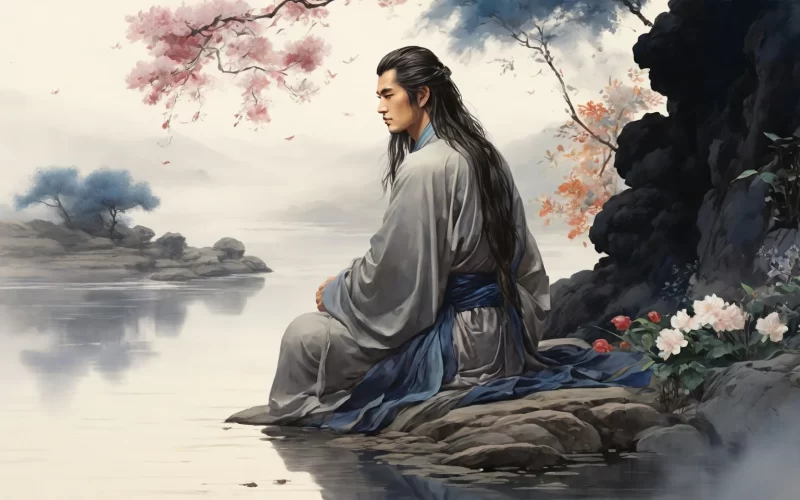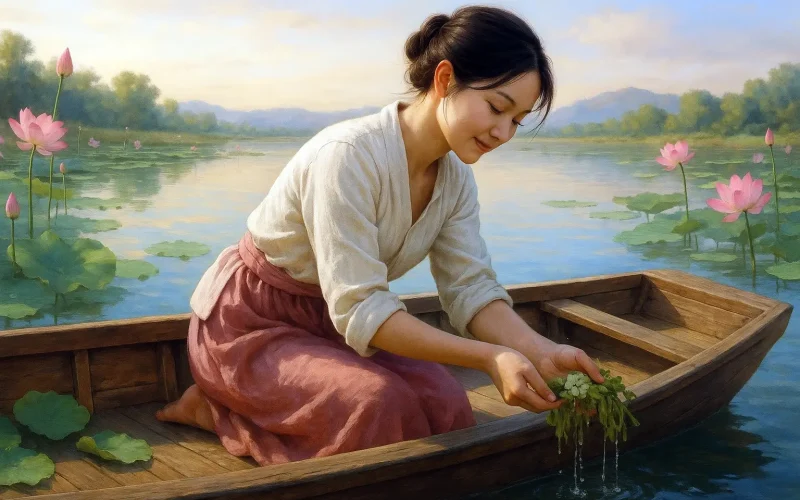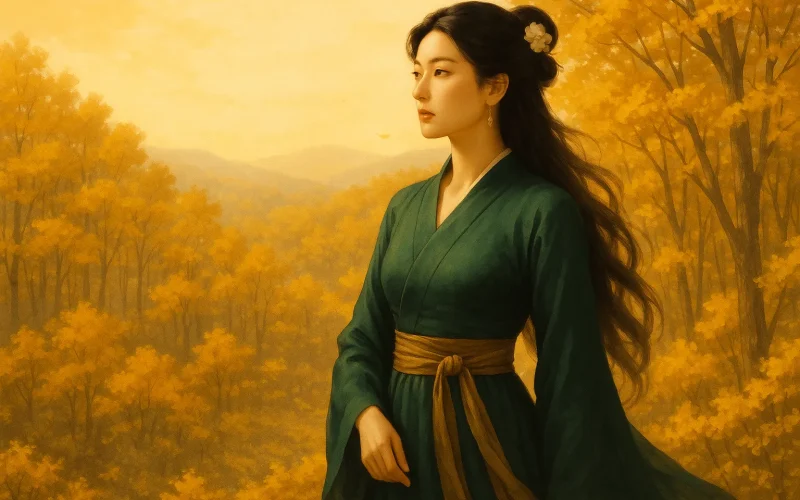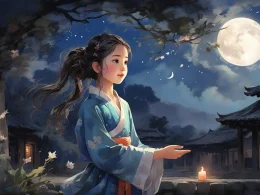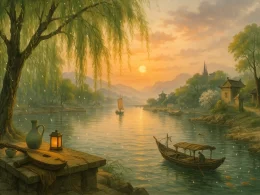The Sunny Terrace’s severed by the Southern Stream;
When Northern grass grows green, on grass I dream.
My longing for you lasts from night till morn,
As endless as the stream that winds from morn to night.
The stream winds from morn to night, to the sea it’s borne,
But I’ve no means to see you in my plight.
Can I send my tears so far, wafted by the breeze,
As a keepsake to the fair one ’yond the seas?
Original Poem
「寄远 · 其六」
李白
阳台隔楚水,春草生黄河。
相思无日夜,浩荡若流波。
流波向海去,欲见终无因。
遥将一点泪,远寄如花人。
Interpretation
This poem is the eighth in Li Bai's series Twelve Poems Sent Afar, composed during an indeterminate year but deeply connected to the poet's experiences of wandering and prolonged separation from loved ones. Channeling his irrepressible longing into the vast imagery of rivers, Li Bai created this romantic masterpiece that combines the direct passion of folk songs with the grandeur of the High Tang spirit.
First Couplet: "阳台隔楚水,春草生黄河。"
Yángtái gé Chǔ shuǐ, chūncǎo shēng Huáng Hé.
The Sunlit Terrace lies beyond the Chu River; While spring grass sprouts by the Yellow River.
The couplet constructs a expansive spatial backdrop for longing. "Sunlit Terrace" alludes to Song Yu's "Gaotang Fu," where a goddess' rendezvous occurs "morning and evening beneath the sunlit terrace"—symbolizing both a physical location and an emblem of ideal love and reunion. Juxtaposed with the distant "Yellow River," it creates a north-south divide. The word "beyond" conveys absolute geographical separation, while "spring grass sprouts" poignantly marks the passage of time, making intangible longing palpable through the concrete imagery of seasonal change.
Second Couplet: "相思无日夜,浩荡若流波。"
Xiāngsī wú rìyè, hàodàng ruò liú bō.
This longing knows no day or night, Surging like mighty flowing waves.
Here, abstract emotion materializes into natural force. "Knows no day or night" emphasizes longing as a perpetual state transcending temporal rhythms. The simile "surging like mighty flowing waves" is inspired: it depicts longing as river-like in its abundance and wave-like in its uncontrollable power, conveying both emotional depth and dynamic momentum that foreshadows the subsequent flow toward the sea.
Third Couplet: "流波向海去,欲见终无因。"
Liú bō xiàng hǎi qù, yù jiàn zhōng wú yīn.
The waves flow seaward, yet my wish to meet you finds no way.
This couplet marks a poignant emotional reversal. While the river follows its natural course toward the sea, the poet's longing remains directionless. The water imagery undergoes a subtle transformation—shifting from metaphorically representing longing's intensity to highlighting the impossibility of reunion. This juxtaposition creates a striking contrast: though nature follows discernible laws, human emotion often confronts insurmountable barriers, rendering deepest yearnings seemingly futile against life's realities.
Fourth Couplet: "遥将一点泪,远寄如花人。"
Yáo jiāng yīdiǎn lèi, yuǎn jì rú huā rén.
From afar I send a single tear, To the one fair as a flower.
The conclusion erupts with sublime romanticism amid despair. When all practical means fail, the poet turns to transcendent imagination. The "single tear" contrasts powerfully with the earlier "mighty waves," yet this most fragile human emotion attempts to bridge the vast distance. The act of "sending a tear" embodies naive devotion and profound tragedy, concentrating the poem's emotional weight into a crystalline focus—achieving remarkable artistic effect through understated expression.
Holistic Appreciation
This poem moves readers through its sincere emotion and grand imagery. Beginning with "separation," developing with "surge," turning with "no way," and concluding with "sending a tear," it traces a complete, undulating emotional journey. By embedding personal longing within majestic images like the "Chu River," "Yellow River," and "flowing waves," the poet elevates intimate sentiment to epic scale. Yet against this vast backdrop, what ultimately shines is the glimmer of a single tear—the contrast between immensity and minuteness, turbulence and concentration, poignantly reveals human emotion's fragility, persistence, and nobility in the face of relentless time and space.
Artistic Merits
- Deliberate Imagery System: Centered on the motif of "water," the poem develops a network of interrelated images—the "Chu River," "flowing waves," "sea," and "tear"—that echo and evolve throughout the text, forming a cohesive symbolic framework that reinforces the emotional narrative.
- Interwoven Time-Space Lyricism: By blending allusions to the "Sunlit Terrace" (a mythical past) with the tangible "Yellow River" (the immediate present), and juxtaposing the seasonal marker "spring grass" (evoking time) with the spatial vastness of the "Chu River," the poem creates a multidimensional lyrical structure that expands its thematic and emotional scope.
- Masterful Emotional Rhythm: The poem’s emotional movement mirrors the flow of a river—swelling in broad surges, circling in restrained eddies, and culminating in a resolute outpouring. This rhythmic variation allows for both intense expressiveness and nuanced progression.
- Ultimate Romantic Expression: The act of "sending a tear" transcends physical and logical boundaries, epitomizing Li Bai’s characteristic romanticism. It represents an emotional truth that overcomes circumstantial limitations, illustrating the power of the human spirit to rise above material reality.
Insights
This poem demonstrates that sincere emotion itself is a potent creative force. When real-world paths close, the heart can forge its own way. Li Bai's "sending a tear" is an effort to affirm emotion's existence even in despair—a gentle yet firm resistance to fate's barriers. In modern life filled with uncertainty, where instant messages may not convey true feeling, this focus on emotion itself, this dedication of one's entire vitality to it, may be an antidote to emotional dilution and nihilism. True longing is not merely missing someone afar, but guarding the pure, unyielding emotional sanctuary within one's heart.
About the poet

Li Bai (李白), 701 - 762 A.D., whose ancestral home was in Gansu, was preceded by Li Guang, a general of the Han Dynasty. Tang poetry is one of the brightest constellations in the history of Chinese literature, and one of the brightest stars is Li Bai.






